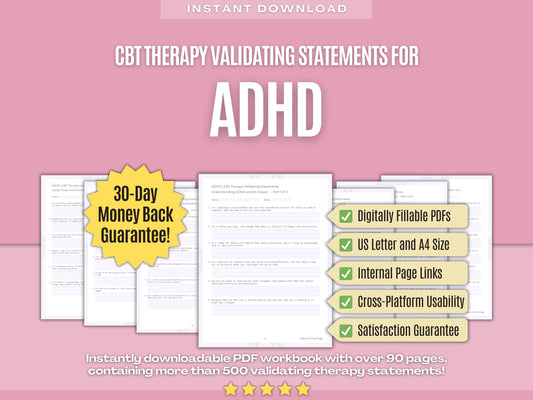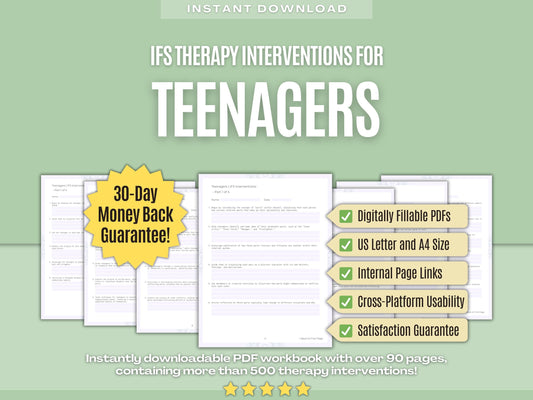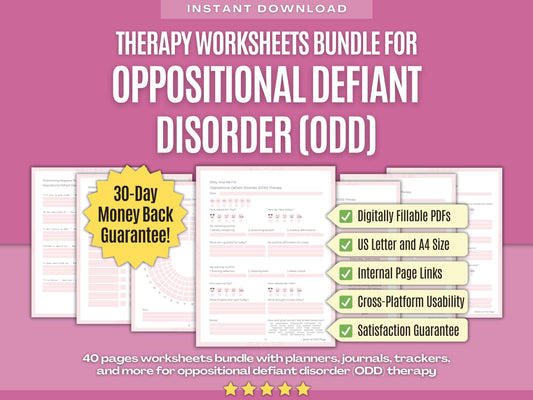Elevate Your Therapy and Guide Your Clients to Inner Healing with Our Hoarding Disorder Validating Therapy Statements! ✨
1. Session Start
- I want to acknowledge your presence here today and commend you for continuing your journey toward healing.
- Your commitment to this process demonstrates a dedication to addressing the challenges you face with hoarding disorder.
- I appreciate the opportunity to work with you again today and to continue our collaborative efforts toward positive change.
- As we begin today's session, I encourage you to reflect on any progress or insights you've gained since our last meeting.
- I want to reassure you that our sessions are a judgment-free zone, where you can feel safe to express yourself honestly.
- I value your perspective and insights, and I'm eager to continue our work together toward your goals.
- I want you to feel empowered to take an active role in our session today, as we work together to address your needs.
- Your well-being is my priority, and I'm committed to providing you with the support and resources you need to thrive.
- Your dedication to self-improvement is admirable, and I'm honored to be a part of your journey toward healing.
- Your experiences with hoarding are unique to you, and I'm here to help you explore them with compassion and understanding.
- I want to assure you that our sessions are a safe space for you to explore your thoughts, emotions, and behaviors without judgment.
2. Understanding Hoarding
- It's important to recognize that hoarding disorder is a complex condition that affects individuals in various ways.
- I want to validate any challenges you may face in understanding or managing your hoarding behaviors.
- I want to acknowledge the impact that hoarding has had on your life and relationships, as well as the courage it takes to address it.
- It's common for individuals with hoarding disorder to experience feelings of shame, guilt, and isolation, which can further complicate the condition.
- Hoarding behaviors often serve as coping mechanisms for deeper emotional pain or trauma, and it's essential to address these underlying issues in therapy.
- I want to emphasize that hoarding disorder is not a character flaw or a result of laziness, but rather a complex mental health condition that requires understanding and treatment.
- I want to validate any ambivalence or uncertainty you may feel about addressing your hoarding behaviors, as change can be challenging.
- Your willingness to engage in therapy and explore your hoarding behaviors demonstrates a commitment to your own well-being and growth.
- Understanding the underlying triggers and motivations behind your hoarding behaviors is a crucial step in developing effective coping strategies.
- I want to validate any past experiences or traumas that may have contributed to the development of your hoarding behaviors and offer a compassionate space for healing.
- I want to reassure you that there is no judgment here in our therapy space, only understanding and support as we work together toward healing.
3. Mindfulness for Clutter
- Mindfulness can be a powerful tool in managing clutter and hoarding behaviors by helping us become more aware of our thoughts, emotions, and actions in the present moment.
- Mindfulness invites us to cultivate a non-judgmental awareness of our surroundings, including the clutter in our homes, without attaching negative labels or criticisms.
- I want to emphasize that mindfulness is not about eliminating clutter overnight but rather about developing a compassionate and non-reactive relationship with our possessions and living spaces.
- I want to validate any resistance you may feel toward mindfulness practices and reassure you that it's okay to start small and gradually build your mindfulness skills over time.
- I want to reassure you that mindfulness is a skill that can be cultivated with practice, and it's normal to experience ups and downs along the way.
- I want to acknowledge any fears or anxieties you may have about confronting your clutter mindfully and offer support as you navigate those feelings.
- I want to validate any past experiences or traumas that may have contributed to your clutter and offer a compassionate space for healing and growth.
- I want to emphasize that mindfulness is not about achieving perfection but rather about cultivating self-awareness and self-compassion as we navigate our clutter.
- I want to reassure you that there is no right or wrong way to practice mindfulness, and it's okay to experiment with different techniques to find what works best for you.
- I want to acknowledge any progress you've made in incorporating mindfulness into your life and celebrate the resilience and determination it takes to cultivate this skill.
- I want to reassure you that mindfulness is a journey, not a destination, and it's okay to embrace the process of growth and discovery as you explore this practice.
4. Dialectical Behavior Therapy (DBT) for Emotional Tolerance
- Dialectical behavior therapy (DBT) offers valuable tools and strategies for building emotional tolerance and resilience in the face of distressing emotions associated with hoarding disorder.
- DBT is grounded in the understanding that emotions are a natural and essential part of the human experience, and learning to tolerate and regulate them can lead to greater emotional well-being.
- I want to emphasize that DBT is a collaborative process, and your active participation and feedback are essential to its success.
- I want to reassure you that progress in DBT is gradual, and it's okay to encounter setbacks along the way as we work toward building emotional resilience.
- I want to validate any resistance you may feel toward certain aspects of DBT and assure you that we can tailor our approach to meet your individual needs and preferences.
- I want to emphasize that DBT is not about suppressing or invalidating your emotions but rather about learning to respond to them in a healthy and adaptive way.
- I want to reassure you that DBT is evidence-based and has been shown to be effective in improving emotional regulation and reducing symptoms of psychological distress.
- I want to acknowledge any fears or anxieties you may have about confronting difficult emotions in DBT and offer support as we navigate those feelings together.
- I want to validate any progress you've made in applying DBT techniques to your emotional experiences and celebrate the resilience and determination it takes to do so.
- I want to reassure you that DBT is a flexible approach, and we can adapt our strategies as needed to address your changing needs and circumstances.
- I want to emphasize that DBT is not about eliminating difficult emotions but rather about learning to coexist with them in a way that promotes growth and well-being.
5. Interpersonal Therapy (IPT) for Relationship Impacts
- Interpersonal Therapy (IPT) offers valuable insights and strategies for addressing the interpersonal difficulties and relationship impacts associated with hoarding disorder.
- IPT is grounded in the understanding that our relationships with others play a significant role in shaping our emotional well-being and overall quality of life.
- I want to emphasize that IPT is a collaborative process, and your active participation and feedback are essential to its success.
- I want to reassure you that progress in IPT is gradual, and it's okay to encounter setbacks along the way as we work toward improving your relationships.
- I want to validate any resistance you may feel toward certain aspects of IPT and assure you that we can tailor our approach to meet your individual needs and preferences.
- I want to emphasize that IPT is not about blaming yourself or others for relationship difficulties but rather about understanding the patterns and dynamics at play.
- I want to reassure you that IPT is evidence-based and has been shown to be effective in improving interpersonal functioning and enhancing relationship satisfaction.
- I want to acknowledge any fears or anxieties you may have about discussing your relationships in IPT and offer support as we navigate those feelings together.
- I want to validate any progress you've made in addressing interpersonal difficulties in IPT and celebrate the resilience and determination it takes to do so.
- I want to reassure you that IPT is a flexible approach, and we can adapt our strategies as needed to address your changing needs and circumstances.
- I want to emphasize that IPT is not about changing who you are but rather about fostering healthier and more satisfying relationships that support your well-being.
6. Emotion-Focused Therapy (EFT) for Attachment to Items
- Emotion-Focused Therapy (EFT) offers valuable insights and strategies for exploring and addressing the attachment to items often experienced in hoarding disorder.
- EFT is grounded in the understanding that our emotions play a central role in shaping our behaviors, including our attachment to possessions.
- I want to emphasize that EFT is a collaborative process, and your active participation and insights are essential to its success.
- I want to reassure you that progress in EFT is gradual, and it's okay to encounter moments of discomfort or uncertainty as we explore your emotional landscape.
- I want to validate any resistance you may feel toward certain aspects of EFT and assure you that we can tailor our approach to honor your unique emotional experiences and needs.
- I want to emphasize that EFT is not about judging or pathologizing your attachment to items but rather about understanding it within the context of your emotional experiences.
- I want to reassure you that EFT is evidence-based and has been shown to be effective in promoting emotional healing and well-being.
- I want to acknowledge any fears or anxieties you may have about delving into your emotions in therapy and offer support as we navigate those feelings together.
- I want to validate any progress you've made in exploring your emotions in therapy and celebrate the courage and resilience it takes to do so.
- I want to reassure you that EFT is a flexible approach, and we can adapt our strategies to support your evolving emotional understanding and growth.
- I want to emphasize that EFT is not about eliminating your attachment to items but rather about developing a more balanced and adaptive relationship with them.
7. Psychodynamic Understanding of Accumulation
- A psychodynamic understanding of accumulation provides a rich framework for exploring the deep-seated motivations and underlying psychological processes involved in hoarding disorder.
- Psychodynamic therapy delves into the unconscious mind, recognizing that past experiences, unresolved conflicts, and unconscious drives influence our thoughts, feelings, and behaviors.
- Your active participation and insights are essential in our collaborative journey through psychodynamic therapy.
- Progress in psychodynamic therapy unfolds gradually, and it's normal to encounter moments of uncertainty or discomfort as we navigate the depths of your psyche.
- Resistance is a natural part of the therapeutic process, and any resistance you may feel toward psychodynamic exploration will be met with understanding and empathy.
- In psychodynamic therapy, we do not assign blame or pathology but seek to understand how your past experiences influence your present behaviors.
- Psychodynamic therapy is evidence-based and has been shown to promote self-awareness, insight, and psychological growth.
- Your fears or anxieties about exploring your unconscious in therapy are valid, and I am here to support you through any discomfort.
- Your progress in psychodynamic therapy reflects your courage and willingness to explore the depths of your psyche.
- Psychodynamic therapy is flexible and adaptive, allowing us to tailor our approach to suit your unique needs and experiences.
- Psychodynamic therapy fosters self-discovery and personal growth through the exploration of unconscious processes.
8. Healing Rhythms in Music
- Your connection to the music is palpable, and it's evident that it serves as a source of comfort and solace for you.
- Your musical preferences offer insight into your unique personality and experiences.
- Your appreciation for music demonstrates a deep understanding of its ability to communicate feelings that words alone cannot express.
- Your eclectic taste in music reflects the complexity and depth of your inner world.
- The way you use music to regulate your emotions is a testament to its therapeutic value in your life.
- The lyrics you resonate with offer validation and reassurance during difficult times.
- It's inspiring to witness the transformative effect music has on your mood and mindset.
- The way you incorporate music into your daily routine shows a commitment to self-care and well-being.
- Music has a way of transcending cultural barriers, connecting people from all walks of life.
- Your musical talents and abilities are a gift that enriches the lives of those around you.
- Your willingness to share your favorite songs with others creates opportunities for meaningful connection and bonding.
9. Concluding Session Reflections
- As we come to the end of our sessions together, I want to acknowledge the progress you've made and the hard work you've put in.
- Your willingness to engage in this therapeutic process speaks volumes about your commitment to your own well-being.
- Throughout our time together, your dedication to self-reflection and personal growth has been truly inspiring.
- Your openness to exploring new perspectives and trying out new strategies has been key to your success.
- As you continue on your path, know that you have the skills and resources to overcome any obstacles that may arise.
- Remember to be gentle with yourself on this journey, and to practice self-compassion every step of the way.
- It's okay to ask for support when you need it, whether from loved ones or from professionals like myself.
- Take a moment to acknowledge how far you've come since we first began this journey together.
- Your willingness to show vulnerability and openness in our sessions has fostered a safe and trusting therapeutic environment.
- Trust in your ability to make decisions that are in alignment with your values and goals.
- Remember that you are not defined by your struggles, but by your resilience and determination to overcome them.
10. Path Forward
- Reflecting on our work together, I see a clear path forward for you as you continue on your journey toward healing.
- Remember that every step forward, no matter how small, is a victory worth celebrating.
- Your willingness to explore new strategies and approaches demonstrates a growth mindset that will support you on your path forward.
- Embrace the lessons you've learned during our time together and use them as tools to guide you on your journey.
- Remember to be patient and compassionate with yourself as you navigate the ups and downs of recovery.
- Take time to reflect on your progress and acknowledge how far you've come since beginning this journey.
- Lean on your support system when you need it, and don't be afraid to ask for help when you need it.
- Remember that setbacks are a natural part of the process, and they do not define your progress.
- Your journey toward healing is ongoing, and each day presents new opportunities for growth and self-discovery.
- Trust in your ability to overcome the challenges that lie ahead. You are stronger and more capable than you realize.
- Keep an open mind as you explore new possibilities and opportunities for growth.
We hope that our validating therapy statements for Hoarding Disorder therapy will help you to elevate your therapy practice and guide your clients to inner healing! Do you need more validating therapy statements for Hoarding Disorder therapy? Find them all in our Digital Workbook! Or do you have any questions or suggestions for us? Please feel free to contact us at any time!


















